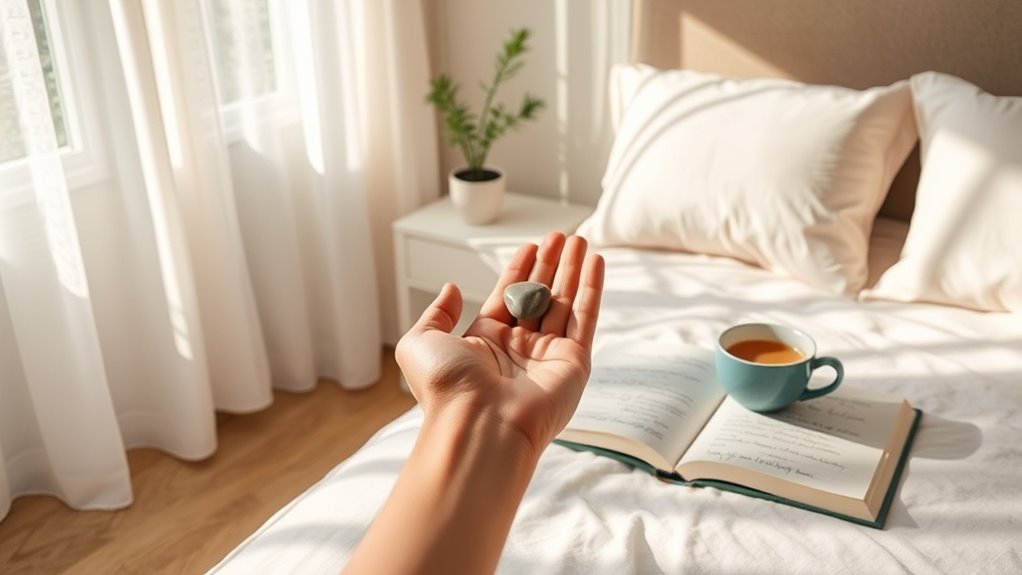Many professionals overlook simple stress reduction habits that can boost focus and resilience. Starting your day with a few minutes of mindfulness or journaling sets a calm tone. Incorporating short breathing exercises and breaks during busy hours helps maintain clarity. Prioritizing restorative sleep with consistent routines also supports your well-being. Keep exploring these habits, and you’ll discover easy ways to strengthen your mental resilience and stay centered throughout the day.
Key Takeaways
- Incorporate daily mindfulness meditation and journaling to promote mental clarity and emotional balance.
- Schedule regular short breaks and breathing exercises to reset focus and reduce tension.
- Prioritize consistent, restorative sleep routines for better stress management and overall well-being.
- Use mindful pauses during busy days to stay present and prevent overwhelm.
- Be aware of external signals, like market activity, to avoid impulsive reactions and maintain emotional stability.
Establishing a Mindful Morning Routine

Starting your day with intention can substantially reduce stress and set a positive tone. Begin with mindfulness meditation to center yourself, focusing on your breath or sensations to stay present. This practice helps clear your mind and fosters calmness. Incorporate mindfulness techniques into your morning routine, such as paying close attention to your breathing or surroundings, to deepen your sense of presence. Next, incorporate journaling techniques into your morning routine, jotting down your goals, gratitude, or thoughts. Writing this way sharpens your focus and encourages a reflective mindset. Keep your routine simple—just 10 minutes can make a big difference. By intentionally starting your day with mindfulness meditation and journaling, you create a mental space free of chaos. This habit not only grounds you but also boosts resilience against daily stressors, setting a peaceful and productive tone for the hours ahead.
Incorporating Short Breaks and Breathing Exercises Throughout the Day

To effectively manage stress during busy days, incorporating short breaks and breathing exercises can make a significant difference. Taking mindful pauses allows you to step back from work and reset your focus. During these breaks, practice simple breathing techniques like deep inhales through your nose and slow exhales through your mouth. These breathing exercises help lower your heart rate and clear your mind. Even a quick pause every hour can reduce tension and improve concentration. Use these moments to stretch, relax your shoulders, or close your eyes for a few seconds. Incorporating mindfulness practices into your routine further enhances your ability to stay present and centered. Consistently integrating mindful pauses and breathing techniques into your routine creates a mental reset, helping you stay calm and centered amid daily pressures.
Prioritizing Restorative Sleep and Evening Wind-Down Practices

Prioritizing restorative sleep and establishing effective evening wind-down routines are essential steps in reducing stress and enhancing overall well-being. Good sleep hygiene and consistent bedtime rituals signal your body it’s time to relax, making it easier to fall asleep and stay asleep. Create a calming environment, avoid screens, and choose relaxing activities like reading or gentle stretching. Consistency is key—going to bed and waking up at the same time reinforces your body’s internal clock. Use the table below to compare common evening practices:
| Practice | Benefit |
|---|---|
| Limiting screen time | Improves melatonin production |
| Drinking herbal tea | Promotes relaxation |
| Dim lighting | Signals your body to wind down |
Being aware of crypto pump signals can help you avoid impulsive decisions if you’re also involved in trading activities.
Frequently Asked Questions
How Quickly Can Stress Reduction Habits Impact Overall Mental Health?
You can notice improvements in your mental health within days to weeks by practicing mindfulness techniques and improving sleep hygiene. Regular mindfulness helps reduce anxiety and stress, while better sleep supports emotional resilience. Consistency is key; even short daily sessions make a difference. Over time, these habits strengthen your mental well-being, helping you manage stress more effectively and feel calmer, more focused, and balanced in your daily life.
Are There Specific Habits Recommended for High-Stress Careers?
Like a knight donning armor before battle, you should embrace habits for high-stress careers. Practice mindfulness meditation daily to clear your mind and stay centered. Incorporate regular physical activity, even brief walks, to release tension and boost your mood. These habits act as your shield, helping you navigate intense days with resilience. Consistency transforms these strategies into powerful tools for managing stress and maintaining mental clarity.
Can Stress Reduction Techniques Be Customized for Individual Needs?
Yes, stress reduction techniques can be customized for your individual needs through personalization strategies. By identifying what triggers your stress and understanding your preferences, you can implement adaptive techniques that work best for you. Whether it’s mindfulness, exercise, or breathing exercises, tailoring these methods guarantees they’re more effective and sustainable, helping you manage stress better in your daily life.
What Are Common Barriers to Maintaining Consistent Stress Relief Practices?
You often face barriers like time constraints and lack of motivation that make maintaining consistent stress relief practices tough. Maybe your busy schedule leaves little room for relaxation, or you’re simply not feeling motivated to start. To overcome these hurdles, try short, manageable stress techniques and set small, achievable goals. Remember, making stress relief a priority even in small ways can help you stay consistent and improve your overall well-being.
How Do Cultural Differences Influence Stress Management Strategies?
Have you considered how cultural differences shape your stress management strategies? Cultural norms greatly influence your preferred coping mechanisms, whether it’s practicing mindfulness, socializing, or spiritual rituals. These diverse approaches affect how you perceive and handle stress, making some strategies more effective depending on your background. By embracing your cultural values, you can develop personalized stress relief habits that resonate deeply, helping you stay resilient in daily life.
Conclusion
Did you know that taking just five-minute breaks can reduce stress levels by up to 30%? By establishing a mindful morning, incorporating quick breathing exercises, and prioritizing restful sleep, you’re actively protecting your mental health. Don’t overlook these simple habits—small daily efforts add up to big stress relief. Start today, and see how a few mindful choices can transform your overall well-being and keep stress at bay.










